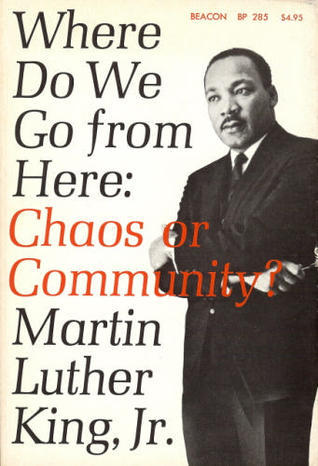Chaos or Community?
¶ by Rob Friesel
In the week or so leading up to this Martin Luther King Jr. Day of 2024, it occurred to me that I had never read any of his “full length” works — only essays, excerpts, and speech transcripts. I wanted to understand more about him and his legacy. I wanted to hear his message more fully, and to engage with it directly rather than having it mediated through a high school teacher or some media columnist.
I no longer recall how this book came to be the one on my “to read” list, but it also seemed fitting to read his last work — as a kind of sign post of his thinking before we lost his leadership.
The most striking thing to me about Where Do We Go from Here: Chaos or Community? is its frank — and at times frustrated — tone. The voice that comes through on these pages is a different one from the way he is so often presented to us in school. As a child, Dr. King is presented as the calm voice of non-violence and of hard-fought changes negotiated at a grand national scale. His non-violent strategies make him “safe” and that his leadership in the Civil Rights movement helps usher in the signing of the 1965 Voting Rights Act. And the way this was presented to us (at least as kids in the 1980s) it was like our teachers and news anchors etc. were saying: “Look, he won! King defeated racism!”
But reading Where Do We Go From Here, it’s evident that King felt that nothing could be further from the truth. That in the two years since the passage of the Voting Rights Act, that nothing substantive had really changed. Sure, there were guarantees in the letter of the law concerning the right to vote — but what good were they without enforcement? Without systems to ensure that those men and women could be enfranchised, that their ballots could be cast, and that once cast those votes would be meaningfully counted?
King’s frustration with the disappointing outcomes of the Voting Rights Act are the tip of the iceberg. He goes into detail about the many systems of oppression that exist within the United States in particular, but in the Western world more broadly, especially vis-à-vis capitalism. While he does not deny that the passage of the Voting Rights Act represented a success, he asserts that it is foolish to believe it was “enough” — in other words, that it was necessary but by no means sufficient. He goes on to describe how even if the U.S. government had put the necessary infrastructure in place to support the goals of the Voting Rights Act, that enfranchisement doesn’t matter much when you’re otherwise lacking in economic and political power. He traces these ills all the way back to America’s original sin of slavery, and the three centuries of consequences for Black Americans. Even Lincoln and the Emancipation Proclamation are not free of scrutiny, for he likens it to a falsely accused prisoner being discharged from the jail naked and penniless into the street.
All of this leads directly — and not surprisingly — to King proposing that a Guaranteed Income (something, what we would these days likely call a Universal Basic Income) is the only workable and just solution. That only by solving the problems of poverty, adequate housing, and education, can we dismantle the systems of White Supremacy that perpetuate oppression of Black Americans.
And while Dr. King continues in this book to advocate for non-violent direct action and to criticize the Black Power movement, this is a “less safe” version of him than the one presented to us in grade school. And it’s frustrating to think how some of his most powerful messages have been deliberately withheld from us.
Leave a Reply